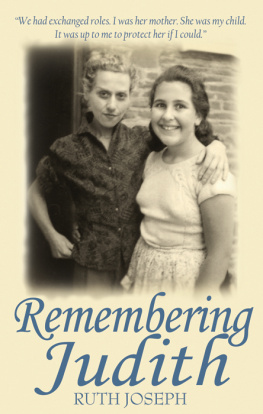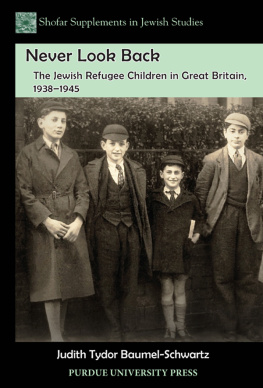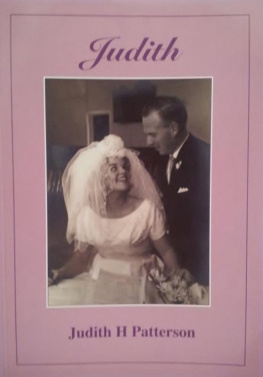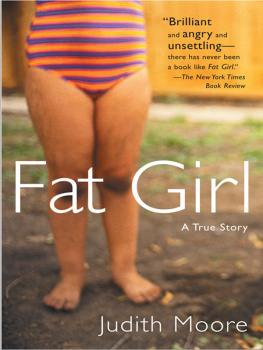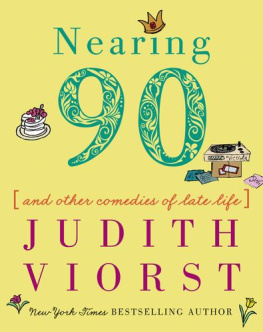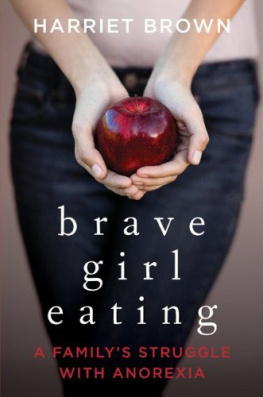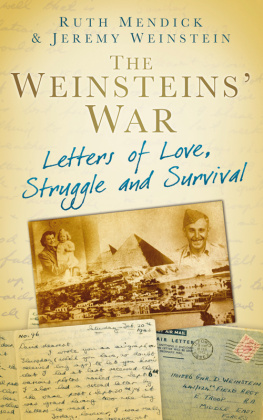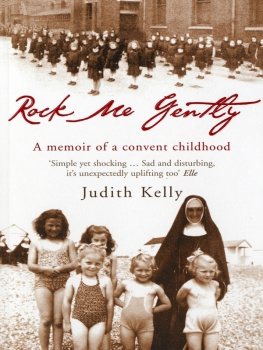Remembering Judith
Ruth Joseph
Published by Accent Press Ltd 2013
ISBN 9781909520615
Copyright Ruth Joseph 2005
The right of Ruth Joseph to be identified as the author of this work has been asserted by her in accordance with the Copyright, Designs and Patents Act 1988.
All rights reserved. No part of this book may be reproduced, stored in a retrieval system, or transmitted in any form or by any means, electronic, electrostatic, magnetic tape, mechanical, photocopying, recording or otherwise, without the prior written permission of the publishers: Accent Press Ltd, The Old School, Upper High St, Bedlinog, Mid-Glamorgan CF46 6RY
Published with the financial assistance of the Welsh Books Council
www.gwales.com
Cover Design by Rachel Loosmore

www.accentpress.co.uk
To Judith
Acknowledgements
A sincere thank you to Hazel Cushion and Rachel Loosmore of Accent Press, who took me under their wing and are always friendly, positive and encouraging, Catherine Merriman my editor and friend for doing such a superb job on this book, Tony Burke from the Welsh National Opera library and my special husband and family.
Your bloody memory taps you on the shoulder when your back is turned. Smell that perfume. Remember when your mother used to wear it?
I am small. About four years old. A scene many of you who were children in the 50s will remember. Shes off to a party. Shes promised shell show me her dress. I lie in my bed waiting, it seems, for hours. Then she pushes open my door and wakes up the dark with a rustle of taffeta, a swish of silk and a mist of perfume.
Lets see, Mummy lets see! Please, put the light on.
She laughs a tinkling sound, not her usual laugh, but in her special other-people voice. She moves to the switch and, suddenly, the room is neon-bright. I blink, rub my eyes, unaccustomed to its dazzle, and she is standing there like a film star, blonde hair set in rigid Marcel waves curling into her slim face, her narrow pale shoulders exposed above folds of shot fabric. Her skirt is decorated with appliqu leaves and flowers, and she twirls on six-inch crocodile platform shoes. She is beautiful. But the vision lasts only seconds. The warmth, the laughter, is gone with a Sweetheart, you must go to sleep now. She leans over the bed planting a dark-red kiss and laughs when it marks my cheek, rubbing the smear with a red-nailed finger. Then she is gone and I am back in the black, and the dressing gown returns to the face of a witch, the man in the moon laughs through the curtained window, and the monsters under the bed sharpen their claws to catch me if I dare dangle a foot.
But later, much later, I hear shouts from their bedroom. They are arguing and I can hear her sobbing it begins as muffled whimpers and intermittent cries like the yelping of a lost puppy. But she often cried thats what girls do, isnt it? The sound becomes louder, and now he is screaming indistinguishable words at her. I call and call. Nobody comes. The monsters are flexing their talons and wont let me get out of bed. So I sing to try to drown their scratching and the bad from that room, with a high-pitched lisping of a repertoire repeated from Music While You Work. Then Im Wilfred Pickles, muttering in a broad north-country accent to Give em the money Mabel. Eventually, I fall asleep.
In the morning, I sit with our mothers help in the breakfast room. Shes made me some porridge. I never like it when she makes it. It is decorated with black bitter flecks. It lies crouching in a blue and white striped dish like a grey solid mound surrounded by a moat of luke-warm milk and topped with a scab of brown sugar crust. Im excavating broken lumps swimming round the bowl, trying to force the stuff down, concentrating on Housewives Choice, which is playing Spanish Eyes and selections from the Desert Song to busy ladies at home in Sidcup and Chichester. My mother walks into the room. She is cross because our help has dressed me in my second best Shabbat outfit a navy knitted skirt and jumper decorated with bunches of red knitted cherries and bleach-white socks. I know shell make me change into last years clothes, now designated as playing clothes. So we make our way back up the stairs, me begging to leave off the liberty bodice. But Im aware that its hopeless and first the liberty bodice and then the old tight clothes are forced over unwilling limbs. We come downstairs and Im duly inspected.
Thats better, she says. Good enough for playing in.
I looked at her bright smiling face, eyes swollen from hours of crying the colour masked with Pancake. I want to ask about the crying and the shouting, but somehow, even at four, I know not to. The rules are set. Tidy. Neat like my mother the lady with standards. Thats the way it was. She was a wife of the fifties and she never told. She lived in happy, happy land with her husband and her daughter and dedicated her life to perfecting their existence. That was what society demanded, and she would always obey. She was used to self-sacrifice.
But this story is not only about my mother. It could be your mother if she lived in the fifties, except she may not have had my mothers precarious start. No one who hasnt experienced life with an anorexic mother could imagine such a life. People might say that living with an alcoholic is similar and, yes, the relentless agony must be comparable. My familys tale is a chronicle of contrasts located in a convoluted world of feasting and fasting. Slivers of joy slipped between chasms of sadness.
My parents circumstances were not unique. There were many like my mother and my father: people who escaped from German oppression. My mother, Judith, came from Hamburg the daughter of a religious and highly respected family and in 1938 journeyed from there to the Hook of Holland and then to Harwich and finally to London. My father, Geoffrey, came from a small farming village outside Breslau. I do not know when or where he arrived. This storys beginning symbolises that time of separation, when young children were torn away from loving families, friends, a fluent language and secure lives, to cross a dangerous bridge to a hostile country, because of the onset of war. They were evacuated to families who took children into their homes, sometimes with altruistic motives, but often as a source of cheap labour. Moreover, these children were thrown into a society very different from their own, within a land of strangers. And this story does not stop with the survivors the ones who made it, who adopted a new country as theirs, absorbed their standards, became assimilated. There is a second generation who are also suffering. In a way, this story is not about my parents but about me. There is so little told about the second generation. Sometime we mask our histories, afraid to tell. Some people, the extrovert personalities, are able to shout and sometimes bully their way through adversity under a defiant banner of pride Yes We Are. So What! Maybe they are the survivors. But there are many more, such as myself, with more cloistered emotions, who still hurt and want to know why. Theres a part of us that has never been allowed to leave the shtetl that small Jewish village in Eastern Europe and the ghetto. We witnessed and still live our parents and relatives pain in its many obscene forms, yet are expected to be tough: to cope. We stand in the wings as they perform their agonies on centre stage, watch, encourage, be comforter, sometimes nurse and even mother. We are the children of those who learnt that duty above all things is paramount. We learned German or Polish or Czechoslovakian, subliminally, through our skins as we took breath. The language of fear seeped into our blood, staining our understanding, our motivation, our confidence. But that language is part of the secret, not to be used, not to be spoken. It is packed away, locked in suitcases that wait on top of wardrobes to join the flight. The words of different lives. Not for others to hear. They must never know. They might suspect we are dissimilar. They might hate us for that.
Next page
